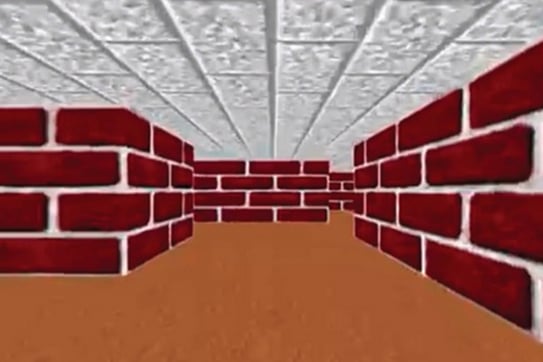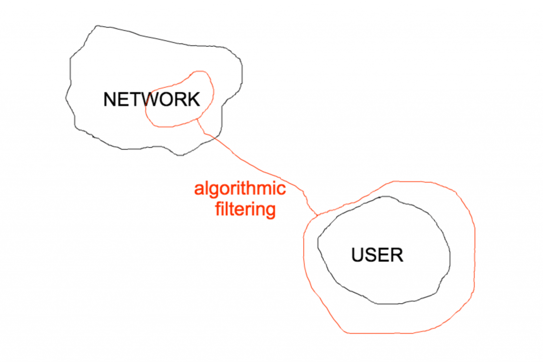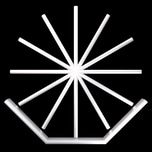On the psychogeography of cities and the internet
Graphite Admin
4/23/20179 min read
Img[1]: Maze screensaver from Microsoft ‘95


[1] Situationism and the Internet
The enduring legacy of the Situationist dérive for the 21st century may include its status as a method for breaking out of the psychic boundaries that delimit one’s daily life to an unchanging routine. In a reflection on the psychogeography of Tijuana, Aurelio Meza quotes Guy Debord’s observation via the text of Chombart de Lauwe that over the course of a year, a student’s daily movements throughout the city of Paris formed “a small triangle with no significant deviations, the three apexes of which are the School of Political Sciences, her residence and that of her piano teacher.” Debord had expressed “outrage at the fact that anyone’s life can be so pathetically limited,” so he proposed the dérive—“a technique of rapid passage through varied ambiences”—as a method for expanding one’s psychogeographical limits. Where capitalism and modernity had together conspired to make narrow psychic hallways out of a large metropolis, surrealism would break things open and make the city a world again.
Is not the internet like a huge city? The obvious analogy here would be to the ways that “closed garden” platforms like Tumblr, Facebook, and Twitter have severely delimited the psychogeography of the internet. Are our daily routines not as pathetic, if not moreso, than those of Debord’s Parisian student? We log on to the same two or three websites, we scroll down, and in the same light blue columns we watch the world pass us by in a confined and monotonous procession. Where is the wonder, the exploration? The internet is larger than any one metropolis, but browsing it today feels like walking down a narrow circular hallway. It is high time we develop a dérive for the internet.
[2] A Parallel Reflection
A quick Google search of “psychogeography internet” leads me to a post titled “Psychogeography of the Internet,” posted to the blog Cosmo-Verse on March 12, 2015. The text of the post reads as follows:
The internet wasn’t meant to be like this.
Coding was meant to be accessible to everyone; the intention was that everyone should be able to create their own webpage or website. But it was hijacked; the internet is not what it seems, and most people only experience the extremely thin and cushioned top layer that exists in the ether; using ergonomic layouts created generically by employees of web design firms. Mirroring the corporeal world, very little interaction really takes place with the workings of users’ surroundings; the wires are not exposed. People are missing out on the opportunity to experience and harness genuine creativity by being handed a sunburst-filtered facsimile of it on a meme-adorned plate. They are missing out on the potential of the glowing ether.
[3] City and Internet as Metaphors
Is not the internet like a huge city? In a 2013 post for CityLab, Emily Badger notes that back in the nineties, the internet used to be thought of precisely in this way. Her discussion, however,begins with an allusion to early histories of colonial settlement:
It was a place that needed to be populated. The early arrivals were homesteaders. Their homepages—like actual homes—were constantly “under construction.” And the very notion of “netizens” implied that because the Internet was a kind of community, people inside it needed to learn to live with one another.
It is very significant that the internet deployed colonial metaphors in its early development, but a proper consideration of this particular metaphor is beyond my present scope. Later in her post, Badger goes on to discuss GeoCities, which was launched in the mid-nineties, got purchased by Yahoo! in 1999, and was then shut down, ten years later, in 2009. This shutdown spurred on a couple of archival projects, meant to preserve GeoCities for future users of the internet. The information designer Richard Vijgen, who built one of these archives, claims that he started to think of GeoCities as a sort of Pompeii, an ancient city preserved forever preserved by volcanic ash.
Throughout her post, Badger argues against the use of a “city” metaphor for the internet. The claim is first made in the posts’ title: “Back When We Thought the Internet Was Like a City: Once we all built homepages on GeoCities, the ‘city’ turned out to be a poor metaphor for the web.” The claim made in the subtitle is first elaborated on in a quote by Vijgen:
“[GeoCities] was talked about as if it was a city, but the structure of the information never really had any visible shape,” Vijgen says. “People were trying to represent the Internet spatially and graphically. Then of course it was a complete disappointment when you would finally be able to get online and discover that it looks like a folder structure, and these pages – they were not very spectacular.”
and then at the end of the post:
Ironically, the Internet has now become itself a metaphor that we increasingly use to understand ideas and objects that predated it, including cities. Citizens have become “users” of government services. Top-down urban planning in some places has been replaced by a “networked” perception of people and places. The way we share information on the Internet now even influences how we share assets in the city.
So it is a fitting moment to remember how we once did the reverse, borrowing from cities to grasp the Internet. “I like the idea of revisiting these old metaphors of the Internet,” Vijgen says, “at a time when the Internet as an idea is spreading beyond the communications network that it originated from.”
This is some useful perspective to consider when thinking about quotidian uses of the internet, and from my position I would like to argue against the naturalness of the supposition that the internet is most truthfully apprehended as a “not very spectacular” arrangement of pages in folders. What is glossed over in such a claim is that the folder itself is also a metaphor, borrowed from bureaucratic culture, that obscures the “real” mechanisms of electrical pulses, processors, etc. Yet what I am arguing for here is not the abandonment of metaphor for a more direct and naturalistic language of computer mechanics. The details of how exactly computers work are very complex, and, to be true, largely irrelevant to most users. For the vast majority of users, computers are not apprehended through their mechanics but through their interfaces. It is also surely misleading in this case to so clearly divide the “mechanism” from the “interface.” All technologies are constituted through a dialectic between the two forms—in their use, their history, their meanings, their material development, etc. In light of all this, I ask: why should we feel compelled to abandon a certain metaphor for a technology because it is not as “true” to what the technology “really is”? Nobody ever apprehends the world for what it really is—apprehension by definition occurs through mediation. It may be argued that, if an interface can be designed to better reflect the real structure of the phenomenon it mediates, then it should be so designed; the problem with technological interfaces, however (and possibly all interfaces, if we imagine worlds and creatures in similar terms as technologies), is that technologies are highly malleable objects, always already produced by a mechanism-interface dialectic that I would argue is not hierarchical but rather lateral or circular (spinning like an eternal vortex). Tools always contain something of junk about them, by which I mean that technologies are fundamentally defined by their openness to the vast possibilities of species use. If we were to produce an interface that treated the internet like a city, then the internet would in all meaningful senses be a city. In this sense it may also be argued that cities themselves are interfaces for physical space, rather than the “truth” of that space.
Badger’s observation that the internet has itself become a metaphor used to understand cities is nonetheless very powerful, and may help us understand the recent ongoing history of urban space. I must point out that her claim that use of a “networking” metaphor borrows from the internet elides the fact that the network is a metaphor that long predated the internet to describe ropes, spiderwebs, and social relations, but she is surely correct in some sense—in the past few decades, the network has in practice come to dominate specifically as a way to understand the internet, but because this metaphor is not inherent to the structure of the internet (is it? what metaphor is inherent to an object’s structure?) there of course may be other ways to metaphorize digital and nondigital worlds. What may be occurring here is a global epistemic shift that I would argue has its origins in the development of cybernetics in the 1950s and beyond. I wonder: what will be (and what have been) the consequences of this epistemic shift? Is this the right shift to go through? Or have we been setting the ground for ever more boredom and catastrophe?
[4] Psychogeographical Techniques of Control and the Digital dérive
It is high time we develop a dérive for the internet… As I write all this, I recall the now-old website StumbleUpon, which allows one the ability to visit different webpages at semi-random. This seems to be pretty close to the internet dérive that I call for, and I’m considering using it more, at least during my leisure time—and it seems here that it is a lack of leisure time along with the corporatization of the web (emblematized by “closed garden” platforms) that is to blame for the constriction of our internet psychogeographies, just as it is both a lack of leisure time as well as the corporatization of city space that constricts our urban psychogeographies. There must be other factors as well. What must be remembered is that, though our psychogeographical problems stem in part from problems with our conceptual repertoires (e.g. the unspoken conviction that one cannot wander beyond their daily routine), they also stem from an assemblage of cultural-political-historical factors that expand the scope of the problem beyond the failures of any one individual or the shape of their specific surrounds. As such, it is worth remembering the Marxist orientation of the Situationist International—that their theories were linked to a sense of proletarian struggle against a reigning capitalist world-order. That is the scope of the issue. StumbleUpon still seems kind of fun though.
—
November 28, 2016. After using it for a couple days I have come to realize that StumbleUpon is not that great after all, and that this is for the same reason that Facebook is not that great. From use, it is clear that both websites are based upon severely unimaginative databases and algorithms, which reduce the internet to a small world of sterile, pre-selected content. In this case, the algorithm and database are technologies that mediate between network and user, capturing the user into a small, “pathetically limited” slice of a massive and diverse world:


The relevance of Guy Debord’s theory of psychogeographical limitation to our contemporary use of the internet involves the insight that our daily lives are invisibly governed by social techniques and technologies, which pass both inside and out of our minds, shaping the ways our worlds and our beings are constituted both in relation to each other and in relation to themselves. Algorithmic design performs the same function for the psychogeography of the internet as does urban architecture for the psychogeography of the modern city. Both are prosthetic technologies of psychogeographical control. Importantly, such technologies are difficult to perceive, partly invisibilized by the very entities who design these technologies. We come to believe, whether explicitly or not, that the world is a small, impoverished place, because complex technosocial assemblages conspire to trap us within small, impoverished routines.
The first step I here posit for transgressing against such forms of invisible control is first to stubbornly imagine the internet as a large city or as some other kind of geographical space, in order to then conceptualize the possibility of going on a dérive in this space. The next step is to then recognize what your usual routine is, and consciously work towards transcending it. What websites do you tend to frequent? Facebook? Twitter? Try taking a day to avoid these sites, and, preferably, to avoid all “closed garden” platforms such as these. Look for unusual routes to unexpected sites; click through to the source page of a picture in a google image search; click to the external sources of strange Wikipedia articles; look up the websites of local organizations… If a certain page doesn’t load, then try to find an old version on the Internet Archive; this particular technique greatly expands your potential terrain, opening to an exploration across the boundaries of time as well as of digital space.
Prioritize the act as well as the concept of wandering. Try moving towards whatever seems interesting, or through whatever seems significantly boring. Save pages into your bookmarks for later exploration. Save links into a personal webpage that others can access, to facilitate their exploration. Don’t worry too much about whether something is useful or not. Just wander around. Try to get lost. Picture each site as another room in some large, seemingly infinite space. Appreciate the richness of what is out there. If my specific techniques don’t seem relevant to you, then invent your own techniques. The idea is to work against the psychogeographical limits one finds themselves in. Develop some sort of idea and practice of wandering. Continually revisit the specific techniques of this practice, adapting them to whatever new limits you find imposed in your life. Recognize that transcending the everyday requires deliberate action. Believe that there is spiritual value in transcending the everyday. Remember that capitalism profits from the impoverishment of your daily life. Maybe use an encrypted browser and an adblocker, in order to unplug your wanderings from the machinations of global capitalism—or turn off your adblocker and deliberately click on advertisements placed on small and esoteric websites, in an attempt to spread the wealth. Experiment. Reflect on your experiments. Develop a repertoire of action and encounter and thought, whatever it takes to find yourself in unexpected situations.
SUGGESTED READING: Control by Seb Franklin / McKenzie Wark’s work on Situationism and the Internet / Texts by Guy Debord and other Situationists
